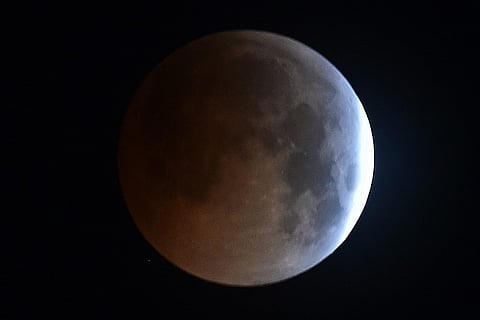

The intervening night of Friday and Saturday was witness to the longest lunar eclipse of this century, which was witnessed by enthusiasts across the globe. The eclipse, however, has a fair share of superstitions attached to it, with a lot of information regarding this floating around on the internet — food that shouldn’t be consumed, harmful radiation from the moon, increase in mosquito population, hormonal changes and so on.
This time was no different. As pointed out by senior Science Editor of ThePrint, Sandhya Ramesh, most mainstream news organisations chose to publish content that furthered such myths.
Express Parenting from the Indian Express, for instance, says, “It’s advised to dispose of leftover food cooked before an eclipse, as harmful radiation during the eclipse may be absorbed by the food.”
The Hindustan Times also goes on to say this —
“It has been found that the physical changes that take place over 28 days during the full lunar cycle, happen within just three hours during a lunar eclipse. These out-of-the-ordinary changes impact the growth of bacteria in food, deteriorating its quality. Thus, it is advised not to partake food during a lunar eclipse, as its quality may get compromised.
The Times of India, on the other hand, says that food cooked up to NINE hours prior to an eclipse should not be consumed.
This is something that has been debunked by the Astronomical Society of India as well as many others.
1. You can eat and drink whatever you want during an eclipse, just as you would normally do so. Nothing changes except that some light is blocked in the sky. Nothing new is created.
— Astronomy outreach (@asipoec) July 26, 2018
2. There are no 'harmful radiations' present during an eclipse. If your shadow falls on the ground, you do not emit any harmful radiation. The same goes for an eclipse.
— Astronomy outreach (@asipoec) July 26, 2018
In the Express, it only goes on to get worse: “Doctors recommend listening to gentle flute music during this celestial phenomenon as it is important for expecting mothers to keep calm, over and above everything else.”
The Times of India, on the other hand, tells expecting mothers to stay inside to ensure that there are no ill-effects on the baby.
Times Now goes on to offer other advice, but can’t decide which side of the argument it falls on. Its advice includes making pregnant women not do chores or go out in the open but instead take adequate rest as the eclipse can have some impact on the blood pressure, hormonal changes, pulse rates etc.
Not doing chores and taking adequate rest is fine, but what does the eclipse have to do with hormonal changes and pulse rates?
Don’t believe us? Let Britannica Encyclopaedia tell you — “Despite extensive investigation, however, scientists have yet to identify an association between full moons and birth rates.”
This time? No surprises. NDTV: https://t.co/yH4qcJ0r57 pic.twitter.com/yyy3ZR93cl
— Sandhya Ramesh (@sandygrains) July 27, 2018
NDTV also reportedly had such content, which seems to be taken down now. The current version of the article says “There is no mention of dos and don'ts in Ayurveda about such beliefs. The only reference that's present is that we should avoid indulging in an auspicious work. It is perfectly safe to eat and drink during eclipse, Ayurveda is a health science and it doesn't promote superstition. Not eating and drinking during eclipse and mandatory bath after eclipse is superstition. One can safely lead a normal lifestyle during eclipse.”
“Eclipse is the time when we realise that the universe is extremely grand where things move constantly. To miss such an event would be a pity," Ramanujam, a member of the Public Outreach and Education Committee at Astronomical Society of India told PTI.
However, when mainstream news organisations, even ones that claim to do ‘journalism of courage’ peddle such superstitions and belief, it doesn’t leave much hope for the rest of us.